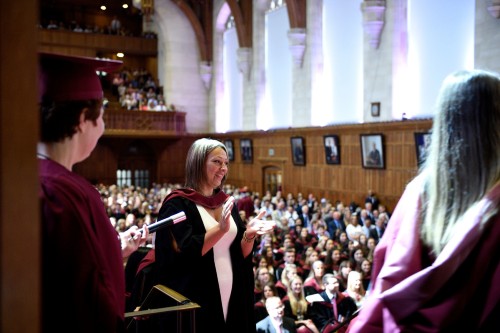Over five working days (Friday 8 to Thursday 14 April) 4,500 students will finally have their graduations conferred after ceremonies were postponed because of the coronavirus pandemic.
This year students will be wearing mortar boards, which have not been part of University of Bristol graduation dress since the 1960s. They are back by popular demand and are expected to once again be part of the graduation regalia for the foreseeable future.
The 15 ceremonies - three per day - will see five distinguished guests receive honorary awards in recognition of their outstanding achievements. See below for more.
Professor Hugh Brady, the University of Bristol’s Vice-Chancellor and President, said: “Graduation is the focal point of the University of Bristol calendar and a chance for students and staff to celebrate their considerable achievements.
“Many of those graduating left us during the pandemic and I am truly thankful that we have this chance to see them again in person, and to congratulate them on their nous, tenacity and aptitude.
“Gaining a degree is challenging. It involves sacrifice and fortitude; intelligence and insight; and every one of the 4,500 new graduates deserve their hard-earned reward.”
The recipients of honorary awards are:
Friday 1.30pm: Tony Macdonald | Honorary degree
Mr Macdonald is a lab technician who worked at the University of Bristol for almost half its existence. In Tony’s 50 years of service he helped countless academics make important breakthroughs, became a pensions trustee, the union branch chair and sat on the University’s governing board for a record number of years. The self-confessed “loner”, with a flair for folk music, learnt to love working with others through the many people he interacted with at the University.
Monday 1.30pm: Gordan Richardson | Honorary degree
Mr Richardson contracted polio aged three, leaving him paralysed from the chest down. Despite this, he completed full-time education and received a degree in Economics and Accounting from the University in 1974. He took early retirement at 50 and for the past 20 years has focussed on helping disabled people. His first big project was co-founding the 50,000 sq ft Bristol-based Vassall Centre Trust (VCT), which is used by disability charities and run by disabled trustees, employees and volunteers. He now holds positions at several disability charities – in Bristol and nationally – and advises businesses and councils on accessibility. He was also a pre-school governor for 15 years.
Tuesday 10.30am: Sarah Fane OBE | Honorary degree
Dr Fane transformed the lives of thousands of Afghans and is receiving her honorary degree in the same ceremony in which her daughter is graduating. The medic has spent three decades in and around Afghanistan, where she has delivered babies in mountain villages, disguised herself as a man to get to patients in need and stayed with mujahideen (the Afghan fighters battling the Soviet Union). Her charity, Afghan Connection, helped some 500,000 children. Her daughter, Antonia Fane, receives a degree in Liberal Arts and French.
Wednesday 10.30am: Denis Burn | Honorary fellowship
Mr Burn is the former Chair of the Board of Trustees at the University of Bristol. He joined the Board (then the ‘Council’) in 2006 as the representative of the Merchant Venturers and in 2010 became the Chair. He has a BSc in Engineering from Bristol and is a past Master of the Merchant Venturers of Bristol. Mr Burn was also Trustee of the Bristol Old Vic and the founding Chair of the Merchants’ Academy in Bristol and South Bristol Youth, which supports young people from disadvantaged parts of Bristol.
Thursday 10.30am: Sheila Rowbotham | Honorary degree
Professor Rowbotham is a historian and writer known for her campaigns for women’s rights. She was involved in organising the first national UK Women’s Liberation Movement conference held at Ruskin College, Oxford, and has been involved in many campaigns since. Her influential pamphlet Women's Liberation and the New Politics of 1969 is widely considered to have been the first manifesto for the new movement in Britain. She has worked as a visiting professor for several universities and is a Visiting Fellow in the University of Bristol’s School of Sociology, Politics and International Studies.
